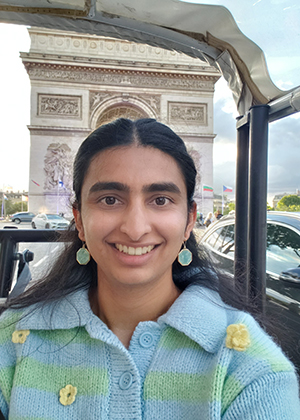
Research staff profile: Malka Dhillon

Introducing Malka Dhillon, a research study coordinator at the University of Washington Department of Rehabilitation Medicine. Malka has been with the department since July 2021 and works on projects that aim to find non-pharmacological treatments for people who experience chronic pain.
What research projects do you work on currently?
I currently work on 2 research projects, FLAReS and MATCH. FLAReS is an observational study to identify physical activities with short-term (transient) effects on lower-back pain (LBP) exacerbations (or "flares" of LBP), as well as identifying the long-term (cumulative) effects of such activities on functional recovery, among Veterans. The MATCH study hopes to better understand who benefits most from Mindfulness-Based Cognitive Therapy (MBCT), Hypnotic Cognitive Therapy (HYP-CT), and Cognitive-Behavioral Therapy (CBT), based on certain personal characteristics. Both studies aim to find results that will help improve treatments for people with chronic pain in the future.
What attracted you to the field of research?
I had some experience of working in research as an undergraduate student and was curious about the processes of a clinical trial and wanted to learn more the conduct of human subjects research. I also wanted to be more involved in research projects that focused on improving chronic pain, because of my prior experience of working with chronic pain patients. This position was the perfect match between these two interests and my curiosity to learn more about the processes involved in conducting research projects.
Why did you decide to work in the UW Department of Rehabilitation Medicine?
I decided to work in the UW Department of Rehabilitation Medicine because I wanted to return to my undergraduate institution as an employee and because the University of Washington is well-known for conducting cutting-edge research and is a leader in innovation. This was an opportunity that gave me a chance to work with leading experts in the field and contribute to science that will make a difference in people's lives. A chance that I am very grateful for today.
What aspect of your job do you enjoy the most?
My favorite part of the job is working with my team within the department. I am fortunate to work with a very supportive, caring, and diverse group of people. I always feel appreciated for my contributions to the project from my team, which is very rewarding. I have gained valuable skills in conducting human subjects research, collaborating with multiple teams in the department, communicating with participants, and using various research/data management tools.
What do you like to do for fun or relaxation?
I love listening to music and am a big fan of going to symphony concerts any chance that I can get. Music helps me feel relaxed and can transport me to happy, often nostalgic, places in my mind. I enjoy traveling and exploring new cities by walking around all day long, which is one of the best ways to explore any new city. I also enjoy reading and watching international TV.
